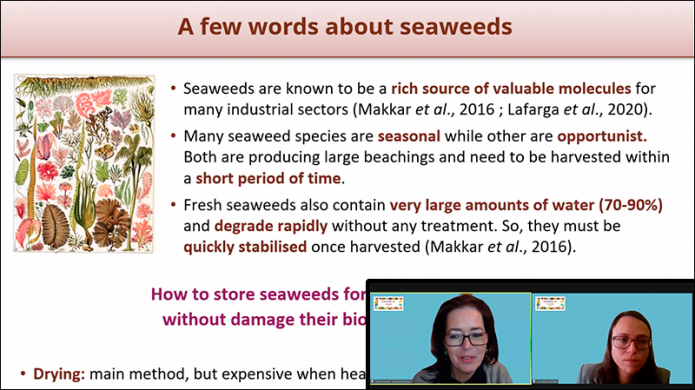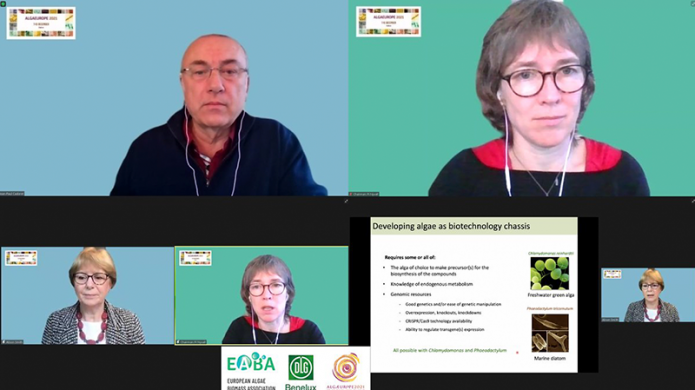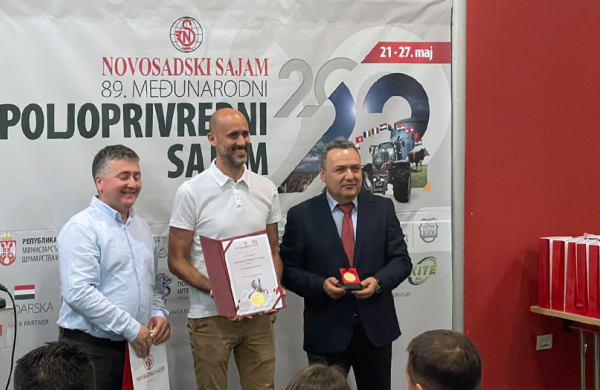Olmix was involved in one of the most global comprehensive conferences addressing scientific, technological and business-related topics within the algae industry.
AlgaEurope 2021, a 4-day online conference hosted by the European Algae Biomass Association and DLG Benelux, succeeded once again to bring together experts from industry and academia involved in algae research, from cultivation to applications, to address the latest scientific and technological topics within the algae biomass sector.
If last year Olmix put the focus on the positive impacts of seaweed production within several industrial fields such as feed, fertilizers and food, this year’s symposium turned out to be a big occasion for the company to discuss the challenges of algae processing and stabilization and the great potential to be found within the Lactobacillaceae family to solve this issue.

Lecture by Caroline Autréau, Olmix PhD student.
“Seaweeds are recognized as natural and abundant resources with great potential for transformation by many industries. However, one bottleneck during processing is that they rapidly decompose once harvested due to their high water content. In this context, seaweed preservation by fermentation, and not only by ensilage methods used in agriculture, are promising techniques,” Caroline Autréau, Olmix PhD student, explained at her lecture.
Strains from the Lactobacillaceae family are potentially good candidates to fill up this gap within algae processing and the thesis subject of Caroline Autreau is to isolate strains of Lactobacillaceae from fresh seaweeds followed by identification and screening of their proteolytic activity, carbohydrate metabolism, bacterial growth rates and NaCl tolerance, in order to select the best strains for fermentation.
The screening included 17 isolates of Lactobacillaceae from fresh seaweeds and 35 strains isolated from food matrices, to verify the impact of origin on the screening parameters. Most strains were found to be weakly proteolytic and isolates from seaweeds showed higher growth rates and were more tolerant to 3.5% NaCl, as could be expected . Carbohydrate metabolic profiles showed a large variety depending on the origin of the bacterial isolates. This work will be pursued by the development of mini models for solid state fermentation of the selected strains combined with metagenetic and peptidomic approaches.
On the other hand, the environmental impact and the role to be played by seaweeds in the context of climate change were two topics brought up to discussion by Pi Nyvall, Olmix’s Scientific Director, who first raised the big concern around the world population and the need to increase production of meat and cereals by 2050.

Pi Nyvall at AlgaEurope 2021.
“The current meat and cereal production won’t be enough in 2050: only 10 % can be achieved by surface increase! The remaining need to be obtained by yield improvement and intensification. Climate change come on top of this, with increased water scarcity, impact on crop production by more instable weather, spread of pests and so on”, Nyvall explained.
According to the expert, seaweed can help to address these challenges via ecosystem services provided by seaweed cultivation such as carbon and nutrient uptake, reduction of ocean acidification, and increase of biodiversity by providing food and shelter. This without competition with terrestrial crops and fresh water.
From 1995, Olmix’s R&D teams have been studying the properties of specific algae molecules, the ones that are nowadays used by the company to develop sustainable products through unique and patented technology. These algae-based solutions are now part of a synergetic program that aims to accompany the agro-ecological transition while helping to mitigate the consequences of climate change.
“Seaweed products can participate in the accompaniment of the agroecology transition and address climate change by improving tolerance of plants and animals to heat stress, improvement of soil quality, improved yields and quality of plant products. This is demonstrated by research groups and seaweed companies world wide,” Nyvall explained.
The results presented and discussions that occurred at AlgaeEurope 2021 will surely feed the great work of general increase of knowledge on seaweeds management and valorization, to achieve the ambitious need of humanity in 2050.




